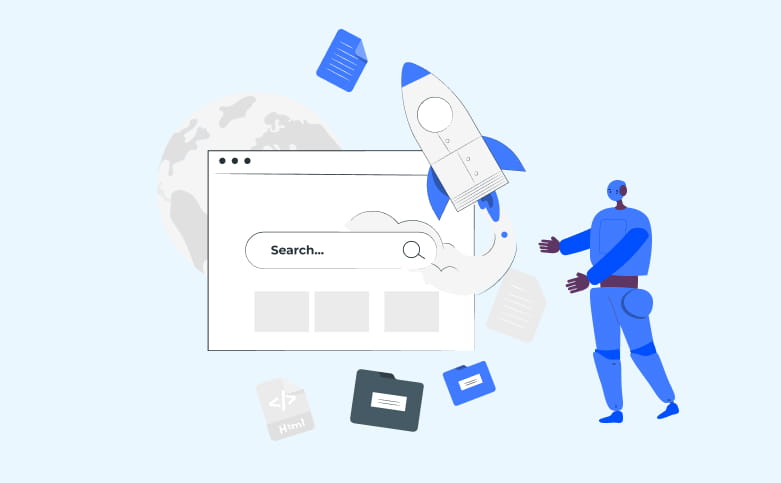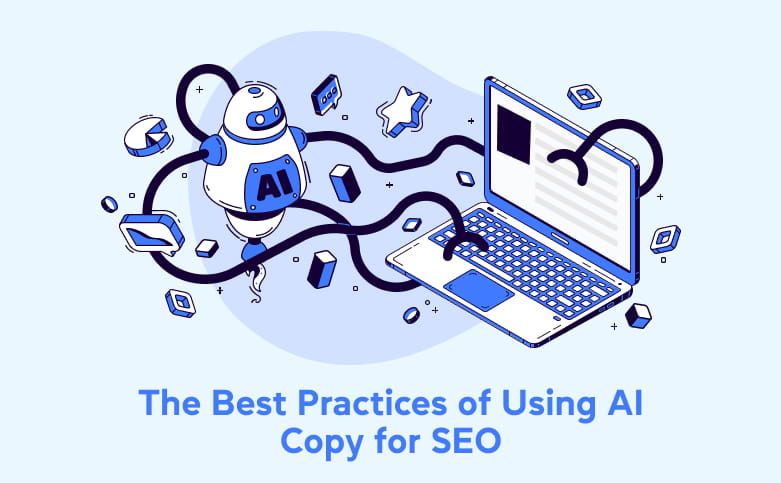The Best Practices of Using AI Copy for SEO
Will using AI content have a negative impact on your SEO rankings? The question is on the minds of many online business owners. If you’re one of them, read on to find out the truth about the SEO potential of AI copy as well as the best practices of using AI content.
Is it a good idea to use AI copy for SEO?
We asked Bard the same question and here’s what it had to say:
“Yes, AI writing can be a good idea for SEO. AI writing tools can help you to create high-quality content that is optimized for search engines. This can help you to improve your website’s ranking in search results and attract more organic traffic.”
But, won’t Google rank AI content lower than human content?

“Google focuses on content quality and relevance, regardless of whether AI or humans generated it. Their official statements and various case studies confirm this.”
Chat GPT agrees:
“As of my last update in April 2023, Google’s approach to ranking AI-generated content is primarily focused on the quality and value of the content, rather than whether it was created by AI or humans.”
In other words, Google doesn’t care whether the content was written by humans or bots, as long as it is original, helpful, and fulfils Google’s E-E-A-T criteria.
So, does it mean you should start churning out 10 blog posts a day using Chat GPT, Jasper or other AI tools? After all, you just have to write the prompts, copy and paste the article that AI tools create for you in seconds. You could easily publish ten thousand or even a million words a day. But, this is where the plot thickens.
Trusting and publishing AI copy blindly without a human writer’s involvement could send your rankings plummeting. Here are a few reasons why
The Pitfalls of AI-Generated Content
Expertise and Authoritativeness Limitations
One significant challenge with AI-generated copy is aligning with Google’s E-E-A-T (Experience, Expertise, Authoritativeness, Trustworthiness) guidelines. AI systems, while advanced, often lack real-world experience and deep domain expertise that human experts possess. They might struggle to capture industry-specific insights or convey a level of authoritativeness that comes from personal experience. This limitation can be particularly evident in specialised fields like healthcare, law, or finance, where expertise is crucial.
Solution:
Augment AI-generated content with insights and validations from human experts in the relevant field.
Trustworthiness Concerns
Trustworthiness in content is largely built on human elements – personal anecdotes, unique insights, and a human voice. AI-generated content might lack these personal touches, making it harder to establish a strong trust connection with readers. Also, the inability of AI to independently verify facts or stay updated with the latest information can lead to trust issues, especially in rapidly evolving fields.
Solution:
Fact check AI content using Google Search. Notice that we had a human writer crosscheck facts and insert a link in the beginning of this blog post, just to be sure and make Bard’s statement look more trustworthy.
Risk of Duplicate Content
AI tools, drawing from similar datasets, can produce content that closely resembles existing material on the web, raising the risk of being flagged for duplicate content. As per Chat GPT, it will produce very similar content given similar or exact same prompts. So, if you’re writing on a hot topic and using AI, and many other people around the world are also writing on the same topic using the same tool, the chances are that the produced content will seem to be duplicate content.
Solution:
Make your prompt sufficiently detailed and focus on some unique angles to make sure that the copy you get is unique and original.
Lack of Contextual Depth
AI tools may not fully grasp the context or intent behind certain topics, leading to content that lacks depth and fails to engage the target audience effectively. Without the nuanced understanding of context, AI-generated articles might miss critical angles or fail to address specific user queries comprehensively.
Solution:
Supplement AI writing with human editing to ensure contextual relevance and depth addressing specific audience needs.
Difficulty with Personalisation
Personalised content, tailored to specific audiences or individuals, is a key component of effective digital marketing. AI systems, despite their data processing capabilities, often lack the ability to deeply personalise content based on subtle audience characteristics or individual preferences.
Solution:
Combine AI-generated content with user data and analytics to tailor the content to specific audience segments.
Quality and Style Inconsistencies
The quality of AI-generated content can be inconsistent. While AI can produce coherent and grammatically correct text, it may struggle with complex sentence structures, subtle nuances, or creative storytelling. This variability can affect the readability and engagement of the content, making it less appealing to both readers and search engines.
Solution:
Implement a rigorous review and editing process to refine AI content, focusing on readability and engagement.
Challenges in Reflecting Brand Voice
Maintaining a consistent and unique brand voice is essential for businesses. AI-generated copy might struggle to replicate specific brand tones or styles, leading to content that feels generic or disconnected from the brand’s identity.
Solution:
Program the AI with brand-specific guidelines and tone, followed by human review to ensure consistency.
The Overwhelming Benefits of AI in SEO

Given that you pay attention to the limitations we mentioned above, AI dramatically accelerates high-quality content creation and can turbocharge your digital marketing strategy. Instead of spending hours brainstorming and writing, AI tools can generate a draft in minutes. This efficiency is invaluable for businesses looking to scale their content production without a corresponding increase in resources. AI algorithms can analyse vast amounts of SEO data to determine what content ranks well. By leveraging this analysis, AI-generated content can be more effectively tailored to rank higher in search engine results pages (SERPs). In fact, writing content without using AI tools in today’s world would be akin to doing research without using Google.
Successful content strategies in the age of AI will likely blend the speed and data capabilities of AI with the creativity, depth, and ethical considerations of human input. This synergy, rather than reliance on AI alone, is the key to thriving in SEO through the AI revolution.








